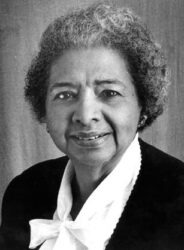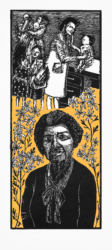In honor of the 40th anniversary of the Artist in Residence Program and Kentucky Women’s Suffrage Centennial in 2020, Bernheim presents FEMMEnomenal Bluegrass Botanicals by Gabriella Boros. This exhibition celebrates the extraordinary achievements of 10 Kentucky women through the invocation of 10 native Kentucky plants.
Meet Dr. Grace Marilynn James
Jefferson County, KY, 1923-1989

Dr. Grace Marilynn James began her pediatric practice in Louisville when city hospitals were legally segregated. Despite these obstacles, she was the first Black woman on the faculty at the University of Louisville School of Medicine. She dedicated her practice to unwed mothers and the poorest of children. Dr. James was a tireless advocate for preventative care and universal healthcare, often giving her impoverished patients food, clothing, and toys.
Grace James was born in Charleston, West Virginia in 1923. After spending her early years in the town of Institute, West Virginia, Grace left to attend West Virginia State College. She completed post-graduate work there and at the University of Chicago before entering Meharry Medical College in Nashville, Tennessee, graduating with an M.D. degree in 1950. Dr. James then moved to New York City, where she completed an internship and pediatric residency at Harlem Hospital. Around this time, she also became a clinical fellow at Babies Hospital and the Vanderbilt Clinic, both part of Columbia Presbyterian Hospital. She also broadened her training to include child psychiatry, studying at Creedmoor State Hospital in Queens Village and becoming a fellow at the Albert Einstein School of Medicine, where she cared for children with disabilities.
In a fellowship application addressed to the National Urban League before she entered medical school, she explained that she had decided to pursue a career in medicine because of “interest in human suffering” and the suffering of Black Americans in particular. She also noted that a visit to Lincoln Hospital in the Bronx had inspired her to help “the ones who needed to be taught, educated and given a chance to learn sound principles of health.” Dr. James made good on these promises when she moved to Louisville in 1953, opening a private pediatrics practice and a walk-in clinic serving Louisville’s impoverished West End residents. In 1974, Dr. James also helped lead the Council on Urban Education and helped establish the West Louisville Health Education Program.
Long before others, Grace was outspoken about Black infant mortality and the underserved Black community at large. Eventually, she became affiliated with eight Louisville-area hospitals, and became the first Black American woman on the staff of Louisville Children’s Hospital and one of only two Black women on the faculty of a southern medical school in the early 1950s.
In a series of public lectures and talks, as she advocated for Black American youth to embrace the study of medicine, she described the obstacles she had to face in her career, including the “triple jeopardy” confronting Black women in particular—that of “racism, capitalism, and sexism”—that prevented many from pursuing or completing their studies. Dr. James was a tireless activist for her causes, including comprehensive, preventive, and universal care.
FEMMEnomenal Bluegrass Botanicals celebrates the collective value women have had on our history, and much like the native plants in Kentucky, despite all the challenges, are still here, standing tall and beautiful, each in their own way.
 Dr. Grace Marilynn James is represented by Harbinger of Spring (Erigenia bulbosa), an early bloomer in dense forests, as Grace was an early spokesperson for Black American health.
Dr. Grace Marilynn James is represented by Harbinger of Spring (Erigenia bulbosa), an early bloomer in dense forests, as Grace was an early spokesperson for Black American health.
While in residence at Bernheim, Boros created a series of woodblock prints that celebrate ten notable Kentucky women. The prints, enlarged into fabric hangings, are suspended from trees along Lake Nevin Loop.
*Additional information for this post courtesy of the U.S. National Library of Medicine at the National Institutes of Health

